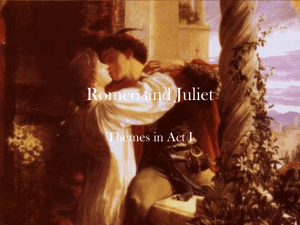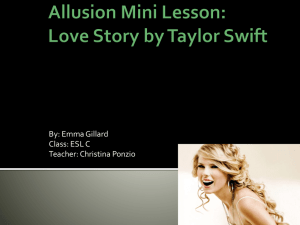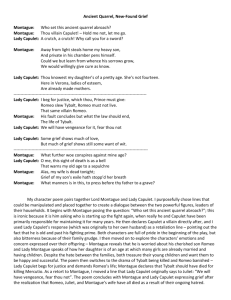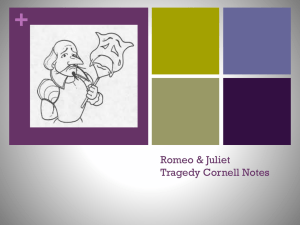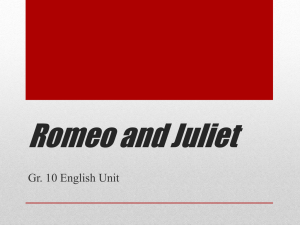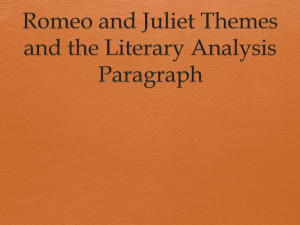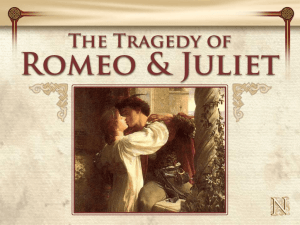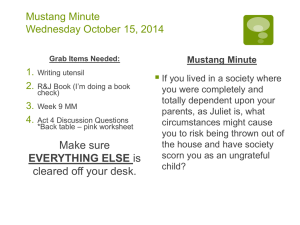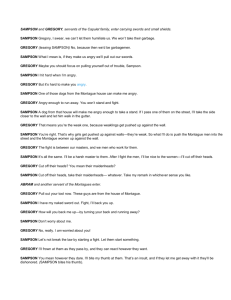Romeo and Juliet discussion questions
advertisement
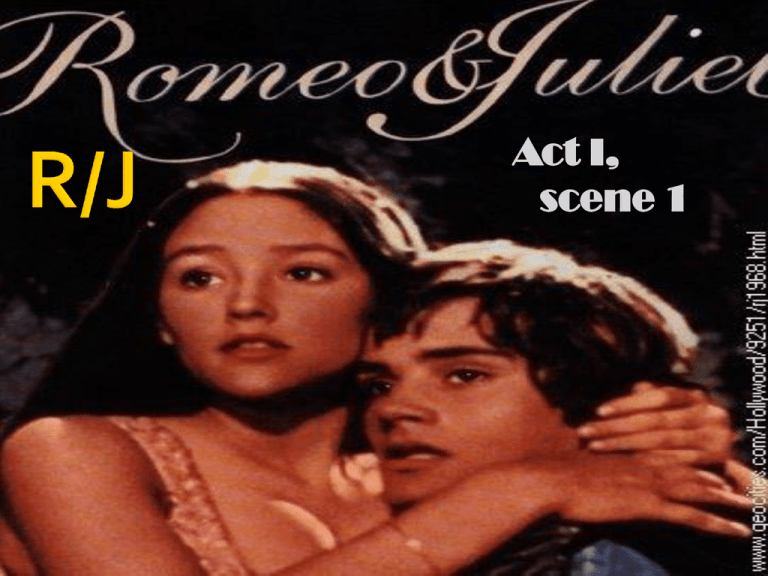
Act I, scene 1 Poetry has regulated line length Frequently, but not always, poetry has meter(meter is the overall beat or rhythm in a given line of poetry. The use of meter in poetry often gives poems a musical quality Prose is everyday writing (letters, novels) Meter is the overall beat or rhythm in a given line of poetry. So how do we determine rhythm/beat? By marking the relative stressed and unstressed syllables in a word (syllables are units of sound for words). Some syllables in words are stressed and some are unstressed. In other words, some are loud and some are soft. Take the word happy—Do we say happy or happy? Mark stressed syllables using a / and an unstressed syllable using a U. / U happy | U / | -- This pattern of unstressed and stressed is an iamb. When used as an adjective to describe meter it is called iambic meter. Just as there are different types of meter, there are also different lengths for each line of poetry. When determining length, one unstressed and stressed syllable = a foot. One foot= monometer 2 feet= dimeter 3 feet= trimeter 4 feet= tetrameter 5 feet=pentameter 6 feet= hexameter 7feet= heptameter 8 feet= octameter u / u / u / u / u / I know l the way l to go l is ov ler there. Pentameter means it has 5 units (feet) of iambic rhythm. u / u / u / u / u / Compare l her face l to some l that I l shall show, Scan this line: And I will make thee think thy swan a crow. Iambic pentameter is also known as the heartbeat rhythm. To be or not to be. (FYI—The opposite of iambic meter is trochaic meter: This pattern is stressed, unstressed represented as | / U |. Double , double, toil and trouble. Shakespeare primarily uses blank verse to write his plays. Blank verse is unrhymed iambic pentameter. You will also encounter the following: heroic couplets (two lines of iambic pentameter linked by rhyme) Prose (usually the lower class characters like servants use prose) The English sonnet has the simplest pattern of all sonnets, consisting of 3 quatrains of alternating rhyme and a couplet: a b a b=quatrain cdcd efef g g = couplet The first four lines =first quatrain Next four lines= second quatrain Next four lines = third quatrain Last two lines =couplet Two households, both alike in dignity, In fair Verona where we lay our scene, From ancient grudge break to new mutiny, Where civil blood makes civil hands unclean. The first four lines =First Quatrain Summarize the lines: The play takes place in Verona, where two household, both alike in social status, have been feuding for a long time (ancient feud). This feud causes the citizens of Verona to act in an uncivilized manner (civil blood makes civil hands unclean). Blood on their hands From forth the fatal loins of these two foes A pair of star-crossed lovers take their life, Whose misadventured piteous overthrows Do with their death bury their parents’ strife. Second quatrain Summary: The two children of these enemies will fall in love and ultimately take their own lives, but in doing so they will end the feud between the households (their parents’ strife). The fearful passage of their death-marked love, And the continuance of their parents’ rage, Which, but their children’s end, naught could remove, Is now the two hours’ traffic of our stage; Third quatrain Summarize: Summary The story of these two unlucky lovers, and of the conflict between their families, which could only be resolved with Romeo and Juliet’s death, will be the topic of the play for the next two hours. The which, if you with patient ears attend, What here shall miss, our toil shall strive to mend. Final Couplet (two lines joined together by rhyme) Summarize: If you listen carefully to the rest of the story, we will explain all on stage. CHORUS :In the beautiful city of Verona, where our story takes place, a long-standing hatred between two families erupts into new violence, and citizens stain their hands with the blood of their fellow citizens. Two unlucky children of these enemy families become lovers and commit suicide. Their unfortunate deaths put an end to their parents' feud. For the next two hours, we will watch the story of their doomed love and their parents' anger, which nothing but the children's deaths could stop. If you listen to us patiently, we'll make up for everything we've left out in this prologue onstage Two households, both alike in dignity A (In fair Verona, where we lay our scene), B From ancient grudge break to new mutiny, A Where civil blood makes civil hands unclean. B From forth the fatal loins of these two foes C A pair of star-crossed lovers take their life, D Whose misadventured piteous overthrows C Doth with their death bury their parents' strife. D The fearful passage of their death-marked love E And the continuance of their parents' rage, F Which, but their children's end, naught could remove, E Is now the two hours' traffic of our stage; F The which, if you with patient ears attend, G What here shall miss, our toil shall strive to mend. G Grudge: a resentment strong enough to justify retaliation; "holding a grudge"; "settling a score" stew: bear a grudge; harbor ill feelings Mutiny: open rebellion against constituted authority Civil: applying to ordinary citizens of or in a condition of social order; "civil peoples“ Star-crossed" or "star-crossed lovers" : a phrase describing a pair of lovers whose relationship is said to be doomed from the start/ reference to fate Tragedy: an event resulting in great loss and misfortune Love: a strong positive emotion of regard and affection; any object of warm affection or devotion; have a great affection or liking for; Directions: Use pg. 3 in your Rand J books to help you decide. 1. Sampson servant of Capulet 2. Gregory servant of Capulet 3. Abraham(Abram) servant of Montague 4. Balthasar servant of Montague 5. Benvolio cousin/kinsman to Montague 6. Tybalt cousin/kinsman to Capulet 7. Romeo son of Montague 8. Juliet daughter of Capulet 2. What words or phrases do the servants use that show their dislike of one another? • Sampson calls the Montagues dogs The servants say there is a quarrel between our masters. Sampson says he will disgrace them by biting his thumb (obscene gesture). • Servants say they serve a “better master.” Tybalt calls them “heartless hinds.” • 3. What originally started this “ancient feud”? We do not know. 4. Who is Benvolio? What type of person is Benvolio? His name means “good will.” He tries to keep the peace. He says, “Part fools, put up your swords. You know not what you do. Pg. 13 5. Who is Tybalt? What type of person is he? Tybalt has a fiery temper. He is hot-head and likes to fight. He says, “What, drawn and talk of peace? I hate the word/ As I hate hell, all Montagues, and thee. Have at thee, coward.” Pg. 13 Throughout the play, Benvolio and Tybalt will be dramatic foils (characters who stand in sharp contrast to one another). 6. What does Lord Capulet ask for his wife to bring him? What does this tell us about him? He asks for his sword. He is also hot-tempered and does not mind fighting. 7. How does Lady Capulet criticize her husband’s behavior? She says, “A crutch, a crutch! Why call you for a sword?” indicating that her husband is too old to be acting like a confrontational youth. 8. Is Montague as eager to fight? How do we know this? Yes, he calls for his sword while his wife attempts to restrain him from entering the brawl. He grumbles, “Hold me not; let me go.” 9. Who is Escalus? What do you think his name means? Why is he so angry? Escalus is the Prince of Verona. His name means scales, as in scales of justice; he is so angry because the Capulet and Montague feud continually disrupts the peace of his citizens. He says, “Three civil brawls bred of an airy word/ By thee , old Capulet, and Montague, / Have thrice disturbed the quiet of our streets.” 10. What does the Prince say the punishment will be for anyone who disturbs the peace again? He says it will cost the person his or her life. 11. Was Romeo at the quarrel? What is wrong with Romeo lately? Do his parents know what is bothering him? Romeo was not at the ‘fray’ or ‘fight.’ Lately, according to Benvolio, Romeo has been taking long walks alone and crying. Lord Montague does not know what is bothering Romeo. Lord Montague said that Romeo has been very secretive lately. He says, “Away from light steals home my heavy son/ And private in his chamber pens himself, /Shuts fair daylight out,/ And makes himself an artificial night.” 12. What does Benvolio find out about Romeo? He finds out that Romeo is in love, however, the girl does not return his love. He says, “Out of her favor where I am in love.” What is Romeo’s state of mind at this time? Romeo is confused and lovesick. He uses a series of oxymorons to express his confusion. He says, “Why then, O brawling love, O loving hate. . .” An oxymoron is the use of two contradictory words placed side by side(opposites). 13. Explain Romeo’s problems in love. Romeo is in love with a girl who wants to remain chaste (virginal). Note Romeo’s flowery language. Romeo is a Petrarchan lover. Petrarchan lovers are versed in love. Petrarchan lovers are in love with the idea of being in love. They courted the object of their affections from afar/ wooed them with poetry, and often thought of love as being painful. 14. What does Benvolio suggest Romeo do to get over his broken heart? He says that Romeo should ‘examine other beauties.’ Courtly love was governed by the customs and traditions of the time. According to custom, the young man must ask the father for the hand of his daughter in marriage. There was no such thing as a “love” marriage because the marriages were arranged by the fathers. Girls were betrothed to whomever their fathers chose, usually in alliances for family betterment. Many times the girl was extremely young. Juliet was not quite fourteen, and her mother says that she herself married at that age. The arranged marriage was based on family status and kinship. By asking Lord Capulet for Juliet’s hand in marriage, Paris abides by all the rules of etiquette and is in harmony with social expectations. On the other hand, Romeo will break all the conventional rules with his impulsiveness and his own values not subject to time or custom. 15. At the beginning of Act I, scene 2, what does Paris want? He wants to marry Juliet, Capulet’s daughter. What is Capulet’s response to Paris. Lord Capulet says that Juliet is too young for marriage. He says, “My child is yet a stranger in the world./ She hath not seen the change of fourteen years. /Let two more summers wither in their pride/ Ere we may think her ripe to be a bride. 16. How does Paris try to change Lord Capulet’s mind? He says, “Younger than she are happy mothers made” meaning that Juliet is old enough to be ‘married with children.’ 17. What advice does Capulet give to Paris concerning his daughter? He tells Paris to win Juliet’s heart. He says, “But woo her gentle Paris, get her heart. My will to her consent is but a part,” indicating that Paris needs to court Juliet before he’ll agree to the marriage. Where does Capulet suggest Paris ‘woo’ his daughter? At his house tonight. He is planning on throwing a feast or ball that same night. 19. What does Capulet ask the serving man to do? Capulet gives the serving man a list of names; the serving man is to give the people on the list invitations to his ball. 20. Why is the serving man upset? He cannot read the list. How is Romeo a Petrarchan lover? What does he say about his love for Rosaline? How does he feel? Romeo is a Petrarchan lover because he associates love with pain. He says, “[I’m] bound more than a madman is,/ shut up in prison, kept without my food,/ whipped and tormented. He is in misery. Who reads Capulet’s letter? Is this coincidence or fate? Romeo reads the letter. Why does Benvolio want to go to the Capulet’s party. He wants Romeo to go to the party because he plans on showing Romeo all of the beauties of Verona. He thinks that if Romeo sees other beautiful girls, he will forget all about Rosaline. Why does Romeo decide to go to the Capulet’s feast? Romeo agrees to go to show Benvolio he is wrong. He does not think there is anyone more fair than Rosaline.
